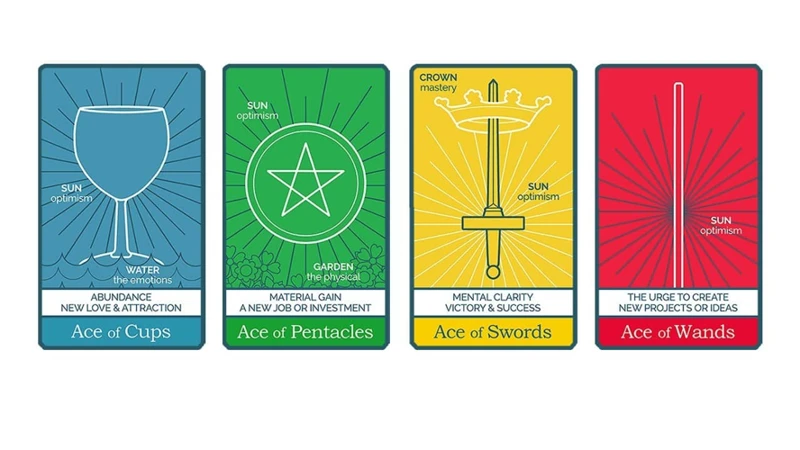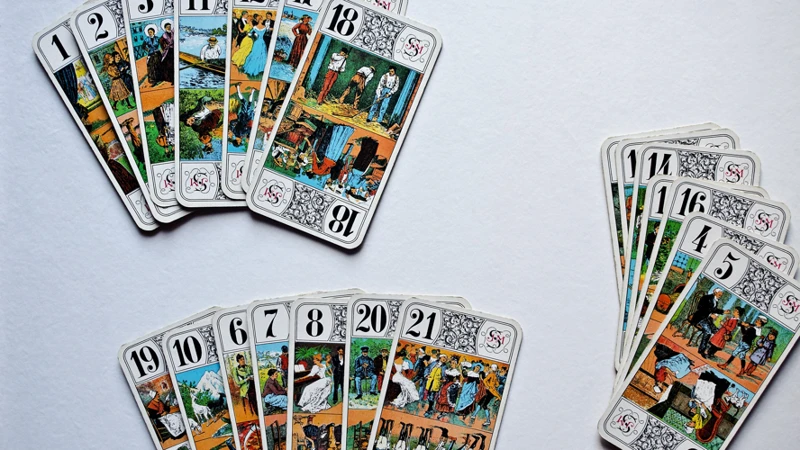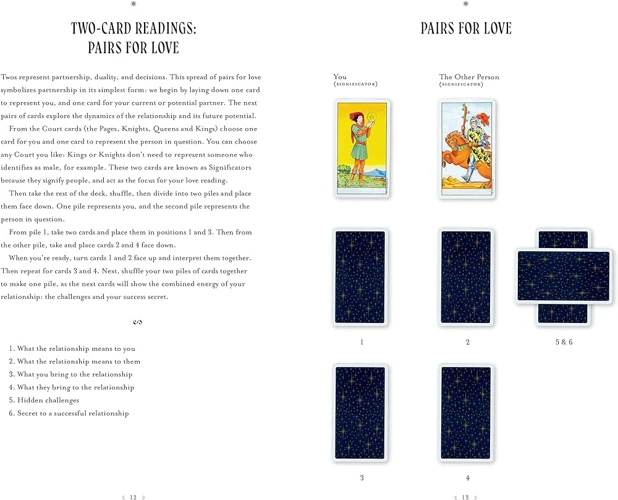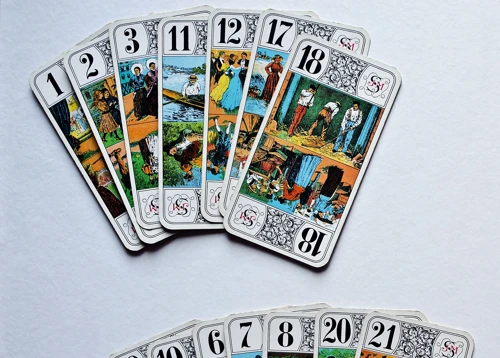Are you intrigued by the mystical world of tarot cards and the art of divination? Perhaps you have dabbled in numerology and discovered the power of numbers and their significance in our lives. In this captivating article, we will explore the fascinating connection between numerology and tarot card meanings, unlocking a whole new level of understanding and insight. By understanding the basics of numerology and how it applies to tarot, we can decipher the hidden messages and symbolism within each card. Join us on this journey as we delve into the intricate relationship between numbers and tarot, and discover how numerology can enhance your tarot readings.
Contents
- The Basics of Numerology
- Numerology and Tarot: A Perfect Pair
- Interpreting Numerological Combinations
- Unlocking Deeper Meanings with Numerology
- Enhancing Tarot Readings with Numerology
- Conclusion
-
Frequently Asked Questions
- 1. What is the significance of the number 1 in numerology?
- 2. What does the number 3 symbolize in numerology?
- 3. How does numerology enhance tarot readings?
- 4. What do the master numbers 11, 22, and 33 represent?
- 5. How can numerology be used in tarot spreads?
- 6. Are there specific tarot cards that are closely connected to numerology?
- 7. Can numerology be applied to the Major Arcana cards in tarot?
- 8. How do court cards relate to numerology?
- 9. Can numerology help determine the timing of events in a tarot reading?
- 10. Are there any resources available to learn numerology in depth?
- References
The Basics of Numerology

Numerology is an ancient system that assigns meaning to numbers and their vibrations. It is believed that numbers hold significant energetic qualities and can provide insight into our personalities and life paths. In numerology, each number is associated with specific characteristics and symbolism, allowing us to tap into a deeper understanding of ourselves and the world around us.
One of the fundamental principles of numerology is reducing numbers to a single digit by adding them together. For instance, if we have the number 25, we add 2 + 5 to get 7. This process is known as “reducing to a single digit” and allows us to uncover the core essence of a number. However, there are exceptions to this rule, which we will explore later in this article.
Numerologists also acknowledge the significance of “master numbers” – 11, 22, and 33 – which possess powerful vibrations and are often not reduced down to a single digit. These master numbers carry great potential and are considered spiritual and influential in numerological analysis.
By understanding the basics of numerology, we can begin to comprehend how numbers influence our lives and how they intersect with the world of tarot. The next section will delve into the harmonious relationship between numerology and tarot card meanings, offering a unique perspective on these ancient divinatory arts. But first, let’s explore the numbered cards and their meanings in tarot, building a foundation for a deeper understanding of this mystical practice.
Numerology and Tarot: A Perfect Pair

Numerology and tarot have a symbiotic relationship, intertwining the power of numbers with the rich symbolism of tarot cards. The combination of these two ancient divinatory arts creates a potent tool for self-discovery and guidance. Numerology provides a framework for understanding the energetic qualities of numbers, while tarot taps into the subconscious realm, offering a visual representation of life’s journey. When used together, numerology and tarot enhance the depth and accuracy of readings, allowing for a more profound exploration of archetypes, themes, and spiritual insights. By applying numerological principles to tarot, we can decipher hidden meanings, patterns, and connections within the cards, providing a deeper understanding of ourselves and the world around us. In the following sections, we will delve into the numerology system in tarot, explore the meanings of numbered cards, uncover the numerological significance of the Major Arcana and Court Cards, and learn how to interpret numerological combinations for a more comprehensive tarot reading experience.
1. The Numerology System in Tarot
1. The Numerology System in Tarot:
In the world of tarot, numbers play a significant role in deciphering the meaning behind each card. Each number holds a specific vibration and symbolism, which adds depth and nuance to the interpretation of the cards. By understanding the numerology system in tarot, we can unlock a wealth of information within the deck.
To grasp the numerological associations in tarot, it is essential to comprehend the basic qualities of each number. For instance, the number 1 represents new beginnings, self-expression, and individuality. It signifies the start of a journey and the potential for growth and development. The number 2 embodies duality, balance, and partnerships, reflecting the importance of collaboration and harmony in our lives.
Moving ahead, we encounter the number 3, which represents creativity, communication, and expansion. It signifies the manifestation of ideas and the power of self-expression. The number 4 embodies stability, foundation, and structure, highlighting the importance of building solid frameworks in our lives. Number 5 brings a sense of change, adaptability, and freedom, reminding us of the constant evolution and unpredictability of life.
The numbers 6, 7, 8, and 9 carry their unique vibrations and meanings. The number 6 symbolizes harmony, balance, and nurturing energies, emphasizing the importance of maintaining equilibrium in relationships and personal endeavors. Number 7 is associated with introspection, spirituality, and wisdom, encouraging us to delve into our inner selves for answers and enlightenment.
Moving forward, the number 8 embodies power, abundance, and transformation. It signifies the material and spiritual rewards that come from hard work and perseverance. Finally, the number 9 represents completion, culmination, and spiritual fulfillment. It marks the end of a cycle and paves the way for new beginnings.
By delving into the numerology system in tarot, we can see how each number carries its unique energy and influences the interpretation of the corresponding tarot card. Understanding these numerological associations adds depth and intricacy to tarot readings, allowing us to uncover hidden meanings and insights that could otherwise be overlooked. In the next section, we will explore the specific meanings behind the numbered cards in tarot and how numerology enhances our comprehension of their symbolic messages. To learn more about the suits in tarot and their meanings, you can visit our guide on tarot suit meanings.
2. The Numbered Cards and Their Meanings
In tarot, the numbered cards hold a wealth of meaning that can be enhanced through the lens of numerology. Each numbered card in the tarot deck, from the Ace to the Ten, corresponds to a specific number that carries its own vibrations and symbolism.
The Ace represents new beginnings, potential, and the pure essence of its corresponding suit. For example, the Ace of Cups signifies love, emotions, and relationships, while the Ace of Pentacles represents material abundance and prosperity.
Moving on to the twos, these cards often represent balance, harmony, and partnership. The Two of Swords reflects the need for decision-making and finding equilibrium between opposing forces, while the Two of Wands signifies taking the first steps towards fulfilling your ambitions and exploring new opportunities.
As we progress through the numbered cards, each number and suit combination brings forth its own unique energy. The Three of Cups symbolizes celebration, friendship, and joy, while the Three of Swords may signify heartbreak or emotional pain. The fours embody stability and foundation, with the Four of Pentacles showcasing security and the Four of Wands representing a solid framework or structure in life.
Moving towards the middle of the deck, the numbers become more complex and multi-layered. The Five of Cups illustrates loss and disappointment, urging us to find solace in what remains. The Six of Swords represents a journey towards calmer waters and leaving behind turbulent times.
The numbered cards continue to convey their own meanings through numerology, intertwining with the traditional interpretations of tarot. By combining the numerological significance with the elemental qualities of each suit, we gain a deeper understanding of the messages these cards hold. In the next section, we will explore the major arcana and their numerological significance, discovering an even deeper level of symbolism and insight in the tarot deck.
3. The Major Arcana and Their Numerological Significance
The Major Arcana is a powerful and symbolic section of the tarot deck, consisting of 22 cards that represent significant life lessons and archetypal experiences. Each card in the Major Arcana holds its own numerological significance, adding an extra layer of meaning and depth to their interpretations. Let’s take a closer look at some of the Major Arcana cards and their numerological associations.
The Fool (0): The Fool is the very first card in the Major Arcana, often assigned the number 0. This number represents infinite potential, new beginnings, and a journey into the unknown. The Fool is a symbol of adventure, taking risks, and embracing life’s uncertainties. Explore the Fool card’s significance to understand its role in tarot readings.
The Magician (1): The number 1 signifies individuality and the power of manifestation. The Magician represents creativity, skill, and asserting one’s will to bring desires into reality. As the first numbered card in the Major Arcana, The Magician represents new beginnings and the ability to manifest our desires in alignment with the universe.
The Empress (3): The number 3 symbolizes creativity, abundance, and fertility. The Empress embodies the nurturing and fertile aspects of the divine feminine energy. This card is associated with motherhood, creativity, and the cultivation of beauty, harmony, and abundance in our lives.
The Tower (16): In numerology, the number 16 reduces to 7 (1+6=7). The number 7 is associated with introspection, spiritual growth, and introspection. The Tower represents sudden and drastic change, destruction, and upheaval. It serves as a catalyst for transformation and breaking down old structures to make way for new beginnings.
Exploring the numerological significance of each Major Arcana card can deepen our understanding of their themes and messages. By incorporating numerology into tarot readings, we can uncover hidden patterns and gain further insight into the transformative journey represented by the Major Arcana. As we move on to the next section, we will explore the connection between numerology and the Court Cards in tarot, unraveling more layers of meaning and symbolism within the deck.
4. The Court Cards and Numerology
The Court Cards in tarot represent distinct personalities and archetypes, and their connection to numerology adds another layer of depth to their interpretations. In a standard tarot deck, the Court Cards consist of the King, Queen, Knight, and Page for each suit. Each Court Card is associated with a specific number, which offers insights into their characteristics and traits.
Let’s examine the Court Cards and their numerological significance:
1. The King: The King represents leadership, authority, and ambition. In numerology, the number associated with the King is One, symbolizing individuality and manifestation. The King is a powerful figure who takes charge and makes decisions with confidence and assertiveness.
2. The Queen: The Queen embodies nurturing, intuition, and emotional intelligence. In numerology, the number associated with the Queen is Two, representing balance, partnership, and harmony. The Queen is compassionate and caring, with a strong connection to her emotions and the emotions of others.
3. The Knight: The Knight signifies action, movement, and adventure. In numerology, the number associated with the Knight is Three, symbolizing creativity, communication, and self-expression. The Knight is energetic and dynamic, always seeking new experiences and challenges.
4. The Page: The Page represents youthful energy, curiosity, and learning. In numerology, the number associated with the Page is Four, symbolizing stability, practicality, and hard work. The Page is eager to explore and acquire knowledge, constantly seeking growth and development.
While the Court Cards possess their own individual meanings and associations, their connection to numerology enhances our understanding of their characteristics and roles within a tarot reading. By considering both the numerological aspect and traditional interpretations of the Court Cards, we gain a more comprehensive understanding of their messages and guidance. As we delve deeper into the world of tarot and numerology, we uncover the intricacies and intricacies of the divinatory arts.
Interpreting Numerological Combinations

When interpreting tarot card readings, understanding numerological combinations can provide deeper insights and shed light on the interconnectedness of the cards. One method of interpreting numerological combinations is by adding up the numbers in a tarot reading. For example, if you receive the cards The Magician (1) and The High Priestess (2), adding the numbers together (1 + 2) gives you the overall numerological value of 3. This combined energy can provide additional meaning and context to the reading. Master numbers, such as 11 or 22, can also hold significant power and should be considered when interpreting numerological combinations. The numerological aspect in tarot readings adds an extra layer of symbolism and can help uncover hidden messages and patterns within the cards. As we continue to explore the world of tarot and numerology, we will delve deeper into these concepts and discover the ways in which they enhance our understanding of divination.
1. Adding Up the Numbers in a Tarot Reading
When conducting a tarot reading, one of the ways to incorporate numerology is by adding up the numbers in the cards. Each card in the tarot deck has a numerical value that can be used to gain insight and deeper meaning. To do this, simply assign numerical values according to the card’s placement in the deck. For example, the Ace of Cups has a numerical value of 1, the Two of Cups has a value of 2, and so on.
Once the numerical values are assigned, you can add up the numbers in a tarot reading to uncover hidden themes or patterns. This practice allows you to explore the numerological energies at play and understand the overall message of the reading. For example, if the cards in a reading add up to a master number like 22, it signifies a powerful and transformative energy. On the other hand, if the total adds up to a single-digit number like 5, it suggests a sense of change and adaptability.
By adding up the numbers in a tarot reading, you can gain a holistic perspective and delve deeper into the interconnectedness of the cards. This technique enhances the accuracy of your interpretations and provides a more nuanced understanding of the tarot spread. Remember, each number carries its own unique vibration and meaning. By examining the cumulative effect of the numbers, you can uncover valuable insights into the querent’s situation.
In the next section, we will explore the power of master numbers in tarot readings and the significance they bring to the interpretation. Understanding these influential numbers can take your tarot practice to the next level and provide even greater depth and clarity in your readings. But before we dive into that, let’s continue to explore the intriguing world of numerology and its connection to tarot.
2. The Power of Master Numbers in Tarot Readings
Master numbers, such as 11, 22, and 33, hold a special significance in tarot readings. These numbers possess heightened vibrations and carry additional layers of meaning and power. When these numbers appear in a tarot reading, they amplify the energy and significance of the cards and highlight transformative experiences and potential outcomes.
Master Number 11: Known as the “illumination” number, 11 signifies heightened intuition, spiritual insight, and awakening. In tarot, the appearance of the number 11 may suggest a profound spiritual journey or the need to trust your inner guidance. It can also indicate a need for balance between your spiritual and earthly pursuits.
Master Number 22: Referred to as the “master builder,” 22 represents the manifestation of dreams into reality. When this number appears in a tarot reading, it symbolizes the potential for great achievement, success, and the ability to create lasting structures. It encourages practicality and the utilization of your skills and resources to bring your goals to fruition.
Master Number 33: Considered the “master teacher,” 33 embodies compassion, healing, and the potential for spiritual service. In tarot, this number signifies the capacity to uplift and inspire others through your words and actions. It suggests a calling to make a positive difference in the world and to embrace your role as a guide or mentor.
When interpreting tarot cards associated with master numbers, it is important to recognize the deeper significance they bring. These numbers indicate extraordinary potential and transformational opportunities. They push us to tap into our higher selves and embrace our innate power to create change. By understanding the power of master numbers in tarot readings, we can uncover hidden messages and unlock new layers of insight to enhance our understanding of the cards.
Unlocking Deeper Meanings with Numerology

When it comes to tarot card readings, understanding numerology can unlock deeper meanings and insights. Numerology allows us to explore the hidden symbolism and patterns within the tarot deck, providing a richer understanding of the cards and their messages. One way numerology enhances tarot readings is through the recognition of tarot number patterns and their significance. By identifying recurring numbers or sequences in a tarot spread, we can uncover additional layers of meaning and symbolism. For example, if multiple cards with the number 3 appear, this could indicate a theme of creativity, expansion, and growth. Additionally, numerology allows us to explore the associations between tarot cards and specific numbers, which can provide further insight into their interpretations. Through numerology, we can delve deeper into the mystique of tarot and gain a more comprehensive understanding of its profound wisdom and guidance.
1. Tarot Number Patterns and Symbolism
When exploring tarot, it becomes evident that numbers play a crucial role in the symbolism and interpretation of each card. Tarot number patterns hold significant meaning and can offer further insight into the message the cards convey. Let’s take a closer look at the tarot number patterns and their symbolism.
The Ones (Ace): The ones represent new beginnings, creativity, and raw potential. They signify the initial spark of an idea or the seed of a new phase in our lives. The Ace of Wands, for example, represents inspiration and the start of a passionate endeavor. Similarly, the Ace of Cups symbolizes the beginning of emotional fulfillment and love.
The Twos: Twos represent balance, cooperation, and choices. These cards often highlight partnerships, relationships, and the need for harmony. The Two of Swords depicts the struggle between two options or the need to make a decision. The Two of Cups signifies a deep emotional connection and mutual understanding.
The Threes: Threes signify expansion, growth, and manifestation. They represent the results of combining two forces. The Three of Pentacles, for instance, represents collaboration and the successful completion of a project. The Three of Cups symbolizes celebration, friendship, and joy.
The Fours: Fours represent stability, structure, and foundations. These cards often represent a solid structure or a sense of security. The Four of Wands symbolizes stability, celebration, and community. The Four of Pentacles denotes material wealth and security.
The Fives: Fives signify change, challenges, and disruption. These cards often represent a period of transition or an opportunity for growth. The Five of Swords represents conflict and deceit, while the Five of Pentacles signifies financial hardship and loss.
The Sixes: Sixes represent harmony, balance, and cooperation. These cards often indicate a resolution of conflict or the need to find a middle ground. The Six of Cups represents nostalgia, fond memories, and emotional harmony. The Six of Swords signifies transition and moving away from difficulties.
Understanding these tarot number patterns allows us to unlock deeper meanings within the cards. By recognizing the significance of each number, we can interpret the cards with greater accuracy and insight. In the next section, we will explore the associations between numerology and tarot card spreads, further expanding our understanding of this mystical practice. If you’re interested in learning more about the differences between tarot decks, click here.
2. Exploring Numerological Associations in Tarot Spreads
When performing tarot spreads, the arrangement and placement of the cards hold significant meaning. Each position in a tarot spread has a specific role and represents a different aspect of the querent’s life or question at hand. By exploring the numerological associations within a tarot spread, we can uncover deeper insights and connections.
To begin, we can examine the total sum of the numbers in a tarot spread. For example, if we receive the cards 5, 7, and 3, the total is 15. We then reduce this number to a single digit by adding 1 + 5, which gives us 6. This final digit represents the overall energy and theme of the tarot spread. A 6 may suggest a focus on harmony, balance, or nurturing relationships within the context of the spread.
We can explore the numerical significance of individual positions within the spread. Each position corresponds to a specific number or range of numbers, providing additional layers of interpretation. For instance, if the third position in a spread is associated with the number 4, we can consider the qualities of stability, structure, and foundation within the context of the cards placed in that position.
It is important to consider the numerological connections between the cards themselves. For example, if two cards in a spread share the same number or have a relationship through numerology, it can denote a stronger connection or emphasis on the shared qualities of those cards. This can provide valuable insights into the relationship between different aspects of the querent’s life or the underlying energies at play.
Exploring numerological associations in tarot spreads allows us to delve deeper into the symbolism and messages within the cards. It adds an additional layer of meaning and helps us to tap into the interconnected nature of the tarot deck. To further explore the intricacies of tarot decks and their differences, read our informative article on “Tarot Deck Differences“. Through the fusion of numerology and tarot, we gain a holistic and insightful approach to divination and self-discovery.
Enhancing Tarot Readings with Numerology
Enhancing Tarot Readings with Numerology adds a layer of depth and insight to the interpretations of tarot cards. By incorporating numerological correspondences into interpretations, a deeper understanding of the card’s meaning and its connection to the querent’s life can be achieved. Each number holds its own symbolism and vibration, and when applied to tarot cards, can reveal hidden messages and guidance. Numerological totals in card combinations further enhance readings by providing a cohesive narrative and revealing intricate connections between cards. By considering both the traditional tarot meanings and the numerological significance of each card, a tarot reader can provide a more comprehensive and personalized reading that resonates with the individual’s unique energy. This integration of numerology and tarot creates a powerful synergy that elevates the accuracy and impact of tarot readings, helping seekers gain valuable insights into their lives and make informed decisions.
1. Using Numerological Correspondences in Interpretations
Using numerological correspondences in tarot interpretations adds an additional layer of depth and meaning to a reading. By associating each card with its corresponding numerological value, we can gain further insight into the messages and themes conveyed by the cards.
To apply numerological correspondences, we first calculate the sum of the digits in the card’s number. For example, if we have the Four of Swords, which corresponds to the number 4, we add 4 + 0 and get 4. This allows us to identify the core energy and symbolism of the card based on its numerological value.
Once we have determined the numerological value of the card, we can explore its significance. For instance, the number 4 is often associated with stability, structure, and practicality. In the case of the Four of Swords, this suggests a need for rest, recuperation, and finding inner peace.
We can also look for patterns or combinations of numerological values within a tarot spread. For example, if the cards in a spread all have odd numbers, it may indicate a phase of action, progress, and forward movement. On the other hand, if the majority of cards have even numbers, it may imply a period of stability, balance, or introspection.
Remember, numerology acts as a complementary tool to tarot interpretations, enhancing our understanding of the cards’ meanings. It should not substitute the intuitive and personal connection between the reader and the cards.
In the next section, we will explore another aspect of numerology in tarot readings, focusing on how numerological totals can offer further insight and guidance when interpreting card combinations.
2. Incorporating Numerological Totals in Card Combinations
When performing a tarot reading, incorporating the numerological totals of card combinations can provide valuable insights and enrich the overall interpretation. Each tarot card holds its own numeric value based on its position in the deck and the corresponding numerology system. By adding up the numeric values of multiple cards in a spread, we can uncover deeper meanings and connections.
For example, let’s say we have pulled the cards The Chariot (7) and The Lovers (6) in a tarot reading. By adding the numbers 7 and 6 together, we get a total of 13. In numerology, we further reduce this number to a single digit: 1 + 3 = 4. The number 4 represents stability, structure, and practicality. The combination of The Chariot and The Lovers suggests that the seeker may experience a harmonious balance between their ambitions (The Chariot) and their relationships (The Lovers), leading to a sense of stability and groundedness in their life.
Incorporating numerological totals can also reveal patterns and recurring themes in a tarot reading. For instance, if we notice that the total of multiple card combinations consistently adds up to the number 9, it could indicate a period of completion and transformation. The seeker may be on the brink of a significant life change or reaching a personal milestone.
It’s important to remember that while numerology adds a layer of depth and symbolism, it should not be the sole determinant of a tarot reading. The interpretation of the cards themselves, the intuition of the reader, and the seeker’s unique circumstances all play crucial roles in delivering an accurate and meaningful reading.
Incorporating numerological totals in card combinations allows us to tap into the profound energetic vibrations of numbers, bringing further clarity and insight to our tarot readings. This technique can deepen our understanding of the messages conveyed by the cards and provide guidance on the seeker’s spiritual journey.
Conclusion
In conclusion, numerology adds a fascinating layer of depth and insight to the interpretation of tarot card meanings. By understanding the basics of numerology and how it applies to tarot, we can uncover hidden messages, symbolism, and themes within the cards. The numerological system in tarot, including the numbered cards, the Major Arcana, and the Court Cards, offer a unique perspective on the energy and vibrations associated with each card. Through numerological combinations, we can gain a deeper understanding of the overall message being conveyed in a tarot reading.
Furthermore, numerology allows us to unlock deeper meanings and symbolism within tarot spreads. By recognizing the patterns and associations of tarot numbers, we can enhance our interpretations and gain a more profound understanding of the messages being conveyed. Incorporating numerological correspondences and interpreting the numerological totals of card combinations can also add another layer of depth to our tarot readings.
Incorporating numerology into tarot readings not only enhances our understanding but also allows for a more holistic and multidimensional approach to divination. It encourages us to consider the significance of numbers as universal symbols and connect with the energies they embody. By embracing numerology in tarot, we open ourselves to a wealth of knowledge and insight that can guide us on our spiritual journeys.
So, whether you’re a tarot enthusiast or a numerology aficionado, the integration of these two ancient practices provides a powerful tool for self-reflection, guidance, and personal growth. Explore the significance of numerology in tarot card meanings and unlock the mysteries that lie within each card. Embark on this magical journey and let the numbers lead the way to deeper understanding and enlightenment.
Frequently Asked Questions
1. What is the significance of the number 1 in numerology?
The number 1 represents new beginnings, independence, and leadership. It is associated with individuality and the pioneering spirit.
2. What does the number 3 symbolize in numerology?
The number 3 signifies creativity, expression, and social interaction. It is often associated with communication and a joyful, optimistic energy.
3. How does numerology enhance tarot readings?
Numerology provides an additional layer of insight by uncovering the vibrational essence of each card. It allows for a deeper understanding of the symbolism within the tarot and can offer nuanced interpretations.
4. What do the master numbers 11, 22, and 33 represent?
Master numbers are highly spiritual and carry immense potential. The number 11 represents intuition and spiritual enlightenment, 22 signifies practicality and manifestation, and 33 embodies compassion and selfless service.
5. How can numerology be used in tarot spreads?
Numerology can be used in a tarot spread by assigning each position a numerical value and incorporating the meanings of those numbers into the interpretation.
6. Are there specific tarot cards that are closely connected to numerology?
Yes, the numbered cards in the tarot deck directly correspond to the principles of numerology. Each card carries its own unique vibration based on its number.
7. Can numerology be applied to the Major Arcana cards in tarot?
Absolutely! Each Major Arcana card has a corresponding number, which can offer valuable insights into their meanings and interpretations.
8. How do court cards relate to numerology?
Court cards in tarot can be associated with astrological signs, elements, and also with numerology. The numerical value of the court cards can provide additional insights into their characteristics and roles in a reading.
9. Can numerology help determine the timing of events in a tarot reading?
Yes, numerology can provide insights into the timing of events by examining the numerical values of the cards and their position in a spread.
10. Are there any resources available to learn numerology in depth?
Absolutely! There are numerous books, online courses, and websites dedicated to the study of numerology. Exploring these resources can enhance your understanding and mastery of this ancient divinatory practice.






